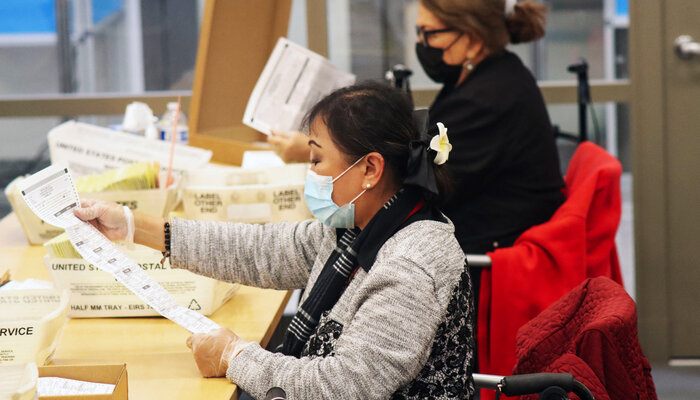This piece was updated to include the outcome of statewide races called in Arizona and Nevada after the time of initial publication.
Election denial was on the ballot in the midterms, and now the verdict is in. As Time magazine and the Washington Post both pointed out, election deniers who ran to oversee elections in key battleground states lost, or are losing, as counts across the country reach their conclusion. That is a relief to those worried about what election administration might look like in 2024 if candidates who cast doubt on the integrity and security of our elections were responsible for running or certifying them.
But there is a more noteworthy point buried in the details of those losses: election deniers in secretary of state contests underperformed other statewide candidates who also lost in their states. In other words, the losses seem to be about more than Democrats having a better-than-expected midterm election. They indicate that voters, regardless of party, really don’t want election deniers in charge of our elections.
There were nearly 300 election deniers running for a range of state and congressional offices across the country in 2022. Throughout this year, the Brennan Center focused on tracking the financing of election administration candidates in battleground states and their statements regarding election denial. Among the most important contests to watch in these battlegrounds were the election deniers running for secretary of state — a vital role for administering elections. Overwhelmingly, the results of the midterms showed that these candidates fared worse than others in their party running for statewide office, including election deniers running for other positions.
In Michigan, voters resolutely rejected election denier Kristina Karamo (R), who filed a lawsuit seeking to stop the count of tens of thousands of absentee ballots in Detroit just eight days before Election Day. (The suit was ultimately dismissed by a Michigan judge for being “devoid of any evidentiary basis.”) Voters elected incumbent Secretary of State Jocelyn Benson (D) by a margin of 14 percentage points, exceeding the margins in Michigan’s two other statewide races. In the gubernatorial race, incumbent Gov. Gretchen Whitmer (D) defeated election denier Tudor Dixon (R) by nearly 11 points. And in the attorney general race, Democratic incumbent Dana Nessel defeated election denier Matthew DePerno (R) by 8 points.
In Minnesota, voters reelected incumbent Secretary of State Steve Simon (D) over election denier Kim Crockett (R), who repeatedly made false claims of voter fraud throughout her campaign, by a similarly wide margin of 10 points. In the other two statewide races for governor and attorney general, Democratic incumbents Gov. Tim Walz and Attorney General Keith Ellison defeated their election-denying opponents by margins of almost 8 points and 0.8 points, respectively.
The same was true in Pennsylvania’s race for governor, who is tasked with appointing the secretary of state to run the state’s elections. Voters chose Josh Shapiro (D) over election denier Doug Mastriano (R), who said he would force all voters to re-register to vote, by a margin of over 14 points. By contrast, the senate race — Pennsylvania’s only other statewide race — resulted in John Fetterman (D) defeating election denier Mehmet Oz (R) by 4 points.
In Arizona’s secretary of state contest, election denier Mark Finchem (R), who falsely called the integrity of the state’s voter rolls into question and said he would ban tabulating machines, lost to Democratic candidate Adrian Fontes by 5 points. In the races for governor and attorney general, Republican election denial candidates Kari Lake and Abraham Hamadeh were each trailing their opponents by smaller margins of around 1 percentage point as of Monday, November 14. However, in an exception to this otherwise consistent trend, it should be noted that election denial senatorial candidate Blake Masters (R) was defeated by Sen. Mark Kelly (D) by over 5 points — slightly more than the margin between the secretary of state candidates.
In Nevada, election denial secretary of state candidate Jim Marchant (R) lost to Cisco Aguilar (D) by about 2 points. By comparison, Republican gubernatorial candidate Joe Lombardo, who has questioned whether the 2020 presidential election was “fair and square,” won by nearly 2 points, and in the senate race, election denier Adam Laxalt (R) lost to Democratic incumbent Sen. Catherine Cortez Masto by less than 1 percentage point. But as in Arizona, Nevada has one exception to the pattern seen in other states, with election denial candidate for attorney general Sigal Chattah (R) defeated by Democratic incumbent Aaron Ford by nearly 8 points. These percentages are based on the latest results as of 1 p.m. ET on Monday, November 14, with 93 percent of votes counted in Arizona and 95 percent counted in Nevada.
And in Wisconsin, where the nonpartisan Elections Commission runs elections, the battle over who would control elections was in the governor’s race. Election denial gubernatorial candidate Tim Michels (R) had threatened to dismantle the Elections Commission and refused to say whether he would certify the next presidential election. In losing to Gov. Tony Evers (D), he too underperformed all statewide candidates from either major party in his state.
One battleground state that did not have an election denier running this fall was Georgia, where incumbent Secretary of State Brad Raffensperger handily defeated election denier Jody Hice in the Republican primary in May.
Taken together, the results of the 2022 midterms suggest that campaigns centered around election denialism are a distinct liability for those who seek to administer our elections.




